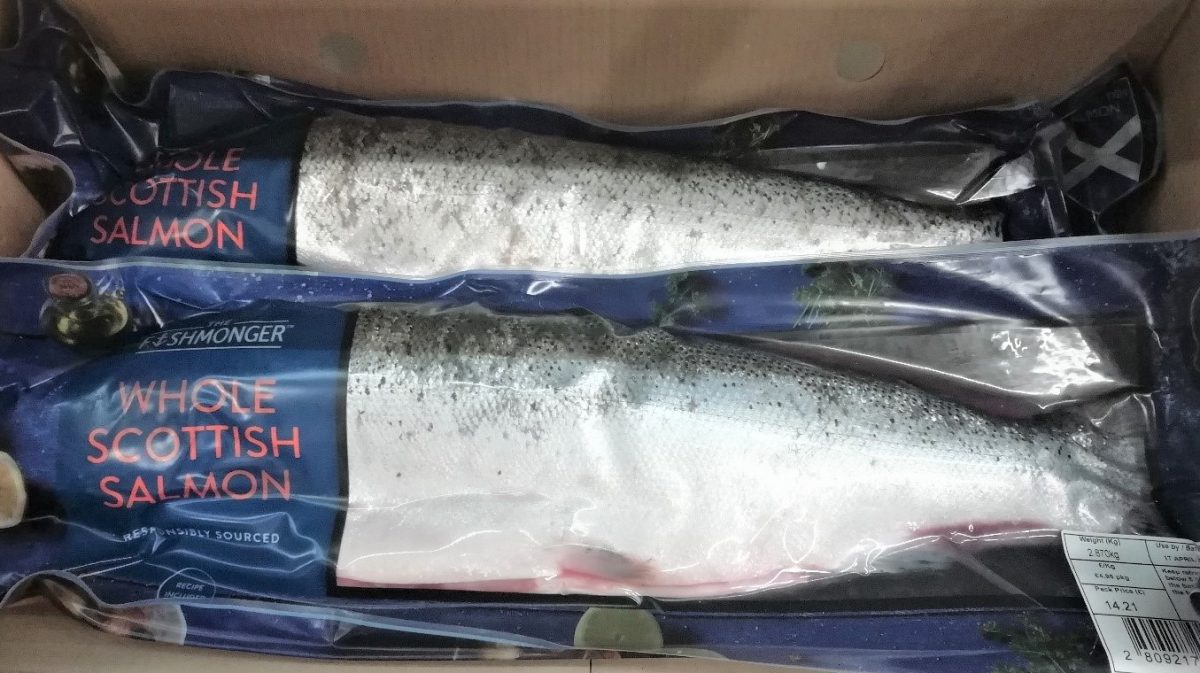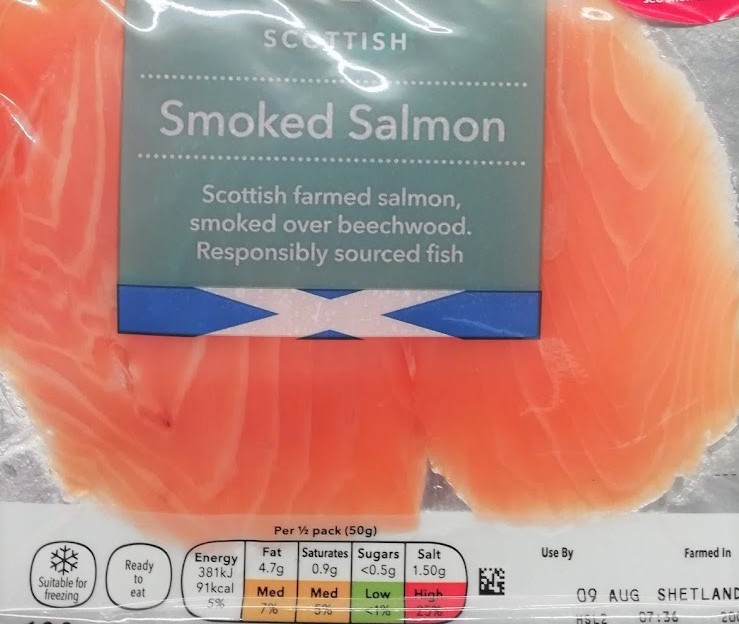
Packaged whole Scottish salmon © Fidra
Fidra conducted a consumer survey on farmed Scottish salmon in December 2019, as the focus of most thoughts in the UK was on Christmas food and drink. The survey aimed to look at what factors influence the choices made by consumers. The results show that consumers would like to know more about where their salmon is coming from and are prepared to pay more if it is sustainably produced.
The present global Covid-19 pandemic is making many of us consider how we impact nature. This includes how our food is produced and distributed, with an emphasis on locally sourced, UK produce. Transparency about where our food comes from and how it is produced is an important part of this.
Main Findings
The main findings of our survey, which is summarised in the report Scottish salmon farming: survey results, were that:
- Price and freshness were the most important factors in choosing to buy Scottish salmon;
- When asked directly if they would be happy to pay more for salmon produced sustainably, 80% of survey respondents answered yes or maybe;
- When asked how much Scottish salmon on sale in the UK is farmed, only 5% answered correctly that it is all farmed;
- The majority of respondents, 64%, would like to see more information on the product labels about the salmon;
- Most, 86%, of participants would like to know the name of the farm the salmon was sourced from. Of these, 40% expressed it would be especially interesting if they could easily find further information about the farm, for example online.
These findings support those of more general surveys on seafood consumption carried out by other organisation such as the Marine Stewardship Council [i], Seafish [ii] and the Aquaculture Stewardship Council [iii]. All show an increasing preference for responsibly and sustainably produced seafood, and a willingness to pay more as a result. The survey carried out by Fidra differs however in that it looks only at Scottish salmon, one of the UK’s main food products, and the attitude of the UK consumer to buying it.
Scottish salmon is still a mainstay of UK households. This is is evident from its prominence in the chiller section of UK supermarkets, the findings of the Seafish ‘State of the Nation’ report (link above) and the ambitions of the industry to grow [iv]. However, the conventional method of farming salmon, using open net pens, can impact the marine environment and have challenges for the health and welfare of the salmon themselves as outlined on our Best Fishers project website [v].
Recommendations
Fidra acknowledges the significance of participants expressing the desire for more information to be presented on the packaging of the salmon products they are buying. There can be solutions and practices put in place to aid this process, increasing the information available to customers. Several examples are outlined in the report, from putting the farm name on packaging and having a comprehensive database online with information on a farm by farm basis, to blockchains. Leading on from this Fidra makes the following recommendations in the report:
1) Retailers label salmon products with farm of origin.
2) Retailers support the call for accessible, transparent, real time information on environmental and sustainability issues to be available on a farm by farm basis online, to enable the consumer to access information on the salmon they are buying.
3) Environmental and sustainability issues are important to consumers, so farming practices need to reflect this by reducing reliance on chemicals known to impact wildlife and moving towards more enclosed structures for treatment and waste capture.
4) In view of consumer concern around environmental sustainability issues, no expansion in Scottish farming should take place until environmental issues are addressed.
Transparency is key
The Scottish salmon farming industry is undoubtedly a significant contributor to Scotland’s economy. In order to ensure that it causes no further harm to Scotland’s unique environment, it is now crucial for NGO’s, industry and regulation to work together.
It is vital that the industry ensures it is operating transparently in a manner that has minimal impact on the environment. Present farms must therefore be assessed and those that cannot be shown to be environmentally sustainable must be addressed, for example by relocation or closure. Then industry leaders, retailers, NGOs, certification and government bodies must work together, throughout the supply chain, to ensure any growth is achieved without compromising the environmental integrity of some of Scotland’s most remote communities and unique habitats.

Packaged smoked Scottish salmon © Fidra
[i] https://www.msc.org/docs/default-source/default-document-library/about-the-msc/msc-consumer-survey-2016-infographic-seafood-consumers-put-sustainability-before-price-and-brand.pdf
[ii] https://seafish.org/media/State_of_the_Nation_Full_Report-web2.pdf
[iii] https://www.asc-aqua.org/news/latest-news/european-consumers-believe-responsible-farmed-seafood-should-be-supermarket-priority/
[iv] https://www.lifesciencesscotland.com/wp-content/uploads/2017/08/lr-sfd-aquaculture.pdf
[v] https://www.bestfishes.org.uk/
Tags: consumer survey, open net pens, salmon farming, Scottish salmon, Scottish salmon farming

